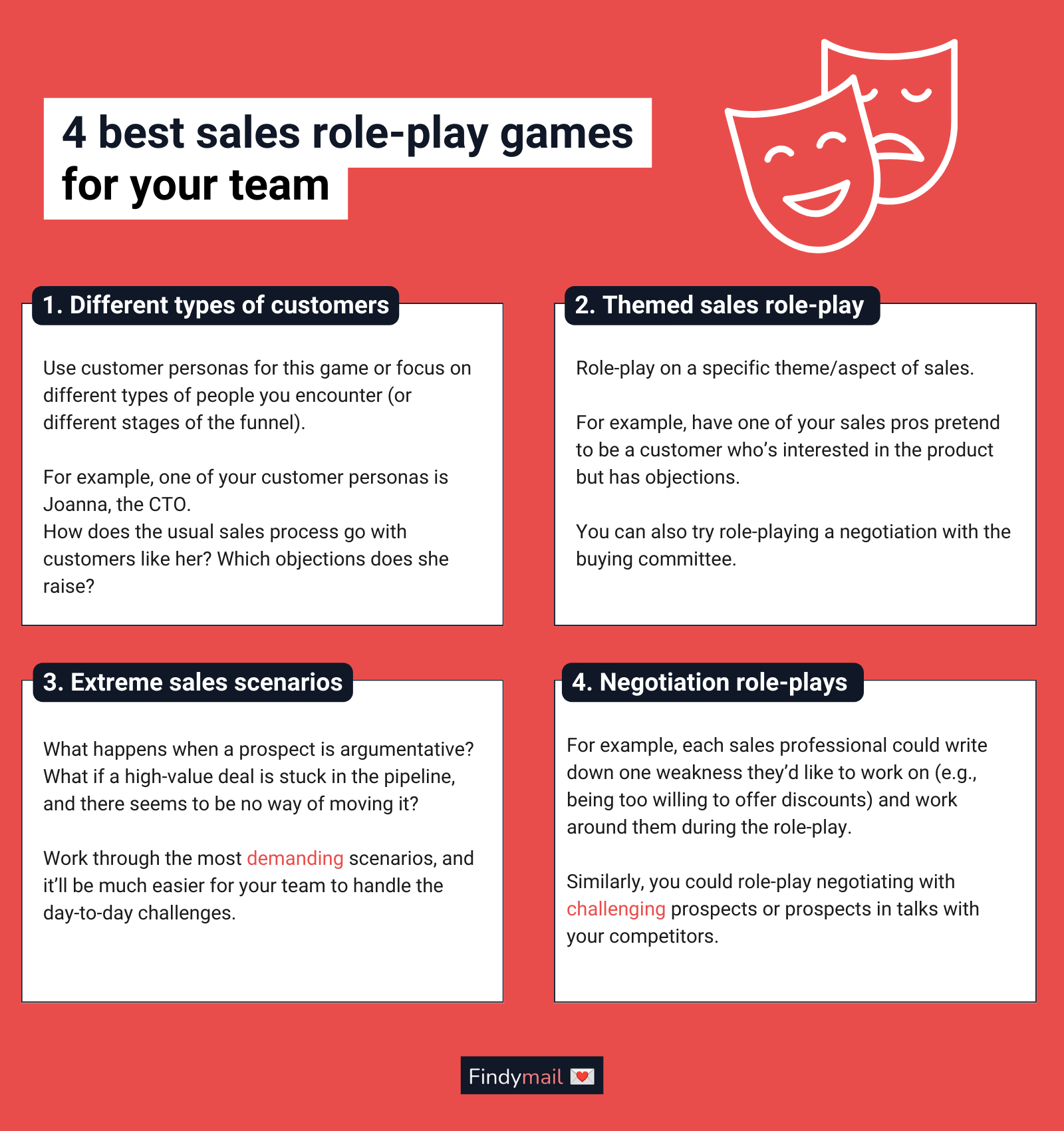SOPs and scripts are one thing. Real situations with tricky customer objections are a whole other beast. So, we turn to sales role-play to boost performance and get the feedback we need to make the sale.
And today, I’m walking you through the best sales role-play games your team can use to connect, improve, and close more deals.

How to Find the Right Sales Role-Play Scenario
Start with the challenges your team brings to you or the ones your metrics show you. For example, if your team struggles to engage buyers, train them to pose high-value B2B buyer questions.
On the other hand, your team may struggle with a specific aspect of their day-to-day routine, such as structuring sales calls.
Identify the most pressing challenge and work on it through sales role-play.
1. Focus on Different Types of Customers with Sales Role-Plays
Use your customer personas for this game, or focus on different types of people your team members encounter in their sales pipelines.
For example, one of your customer personas is Joanna, the CTO. How does the usual sales process go with customers like her? Which objections does she raise?
Have two team members work together, one impersonating your customer persona and the other performing their role.
Then, switch.
Example Sales Role-Play Script
Prospect: Your offer sounds great, but my concern is that our team members [a problem related to end-user experience]. What would happen in that situation?
Salesperson: When that happens, we [explain how you mitigate the problem]. However, we also make sure to [mention how you build relationships with other stakeholders.]
Conversely, you can create a sales role-play scenario with customers at different stages of the funnel:
- Cold call leads
- Prospects who are on the fence
- Prospects shopping for other solutions
How does your team deal with each customer type and ensure they progress through the funnel? Think of different situations they face on the job and collaboratively work through addressing objections and selling with customers’ needs in mind.
Example Cold Call Script
Salesperson: Hi, I’m [name & company], I’ve been doing some research on [prospect’s company], and I’d love to talk to you about [challenge].
Prospect: [Challenge] is not a priority for us right now.
Salesperson: Based on my previous experience with our customers, resolving [challenge] could help you achieve [goal]. Is that on your roadmap for this year?
Prospect: You caught me at a bad time.
Salesperson: I completely understand. Is it okay to send you a follow-up email explaining how we help companies in [industry] deal with [challenge]?
2. Themed Sales Role-Plays
If your team struggles with a specific sales aspect (e.g., dealing with leads’ objections), role-play on a specific theme.
For example, have one of your sales pros pretend to be a customer who’s interested in the product but has objections. Depending on the issues, you could work through statements such as:
- “I’m not sure if we have the budget for this.”
- “Competitor X is offering better pricing.”
- “I’ll need to have my boss look at your offer.”
Similarly, if you’re training new hires - especially in B2B sales - you could role-play the typical buying committee with multiple stakeholders. One stakeholder will be most interested in the budget, another in the technical details, and so on.
Make sure everyone’s objections are adequately addressed.
Example Script
Prospect: I’d love to get started with your product, but it’s slightly out of our budget for now, so we need more time to discuss it.
Salesperson: I completely understand. What are you hoping to get out of this tool?
Prospect: [Explains their goals.]
Salesperson: In that case, our existing plan will help you deal with [obstacle] quickly, but you could [elaborate on the lower price point (if possible)].
Prospect: Could we reduce the price?
Salesperson: I’d have to discuss that with my team, but I’d love to [offer a resource or social proof to reinforce the value they get at the original price point].
3. Role-Play Extreme Sales Scenarios
What happens when a prospect is argumentative? What if a high-value deal is stuck in the pipeline, and there seems to be no way of moving it?
Work through the most demanding scenarios, and it’ll be much easier for your team to handle the day-to-day challenges.
Have them list out the most extreme sales situations they’ve faced on the job, which can include anything from over-involved buying committees to customers who were burned by the previous vendor, and now seem to counter everything your employees tell them.
Then, run through the sales role-play with an open mind. Try to come to a resolution, but don’t force it.
Instead, examine what went well and what could’ve gone better to identify takeaways that can improve your team’s performance in the future.
4. Sales Role-Play to Strengthen Negotiation Skills
Negotiation is vital, but it’s not always easy, especially for new sales professionals who may want to bend over backward to close.
Negotiation sales role-play is fantastic for strengthening professional skills, mitigating weaknesses, and using different negotiation tactics.
For example, each sales professional could write down one weakness they’d like to work on (e.g., being too willing to offer discounts) and work around them during the role-play.
Similarly, you could role-play negotiating with challenging prospects or prospects in talks with your competitors.
Best Practices for Sales Role-Play
Start with Your Challenges
Training new sales hires? Focus on everyday situations and common objections.
Are you working to improve your sales velocity? Devise scenarios that typically halt deals.
No matter what you do, start with the most critical challenges, and encourage your sales team to be open about their struggles. Then, establish the goal of each scenario so it’s clear what the reps need to accomplish.
Use Scripts & Allow Improvisation
If your sales team routinely uses scripts, let them use the materials during the sales role-play, too.
However, give them the liberty of improvising when they feel the script stunts them.
Prepare Before Your Sales Role-Play
You can improvise a scenario, but you’ll get the best results when you equip your reps with the necessary information before heading into the play.
For example, come up with a complete background story or use one of the existing prospects.
Collaborate and Exchange Feedback
Cultivate an environment where your team can offer feedback to you instead of always being on the receiving end.
Wait for the role-play to finish before offering suggestions, and try to phrase them as questions. For example, if you disagree with how they dealt with an objection, ask them why they chose that specific strategy.
Similarly, collaborate with your team on preparing the scenarios and scripts.
It’s Playtime!
Sales role-play is a fantastic tool for improving your performance and strengthening the bonds in your team. However, remember to train your listening skills by providing empathetic feedback.
You’ll experience the benefits soon enough!
And if you need help finding the perfect leads’ email addresses, Findymail has got your back. ;)






